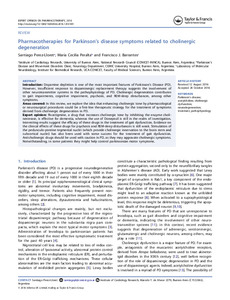Por favor, use este identificador para citar o enlazar este ítem:
https://repositorio.uca.edu.ar/handle/123456789/14304| Título: | Pharmacotherapies for parkinson's disease symptoms related to cholinergic degeneration | Autor: | Pérez Lloret, Santiago Peralta, María Cecilia Barrantes, Francisco José |
Palabras clave: | TRATAMIENTO MEDICO; ENFERMEDAD DE PARKINSON; NEURODEGENERACION; DETERIORO COGNITIVO; DEMENCIA | Fecha de publicación: | 2016 | Editorial: | Taylor & Francis | Cita: | Pérez Lloret, S., Peralta, M.C., Barrantes, F.J. Pharmacotherapies for parkinson's disease symptoms related to cholinergic degeneration [en línea]. Expert Opinion on Pharmacotherapy. 2016, 17(18) doi:10.1080/14656566.2016.1254189 Disponible en: https://repositorio.uca.edu.ar/handle/123456789/14304 | Resumen: | Abstract: Dopamine depletion is one of the most important features of Parkinson's Disease (PD). However, insufficient response to dopaminergic replacement therapy suggests the involvement of other neurotransmitter systems in the pathophysiology of PD. Cholinergic degeneration contributes to gait impairments, cognitive impairment, psychosis, and REM-sleep disturbances, among other symptoms. Areas covered: In this review, we explore the idea that enhancing cholinergic tone by pharmacological or neurosurgical procedures could be a first-line therapeutic strategy for the treatment of symptoms derived from cholinergic degeneration in PD. Expert opinion: Rivastigmine, a drug that increases cholinergic tone by inhibiting the enzyme cholinesterase, is effective for dementia, whereas the use of Donepezil is still in the realm of investigation. Interesting results suggest the efficacy of these drugs in the treatment of gait dysfunction. Evidence on the clinical effects of these drugs for psychosis and REM-sleep disturbances is still weak. Stimulation of the pedunculo-pontine tegmental nuclei (which provide cholinergic innervation to the brain stem and subcortical nuclei) has also been used with some success for the treatment of gait dysfunction. Anticholinergic drugs should be used with caution in PD, as they may aggravate cholinergic symptoms. Notwithstanding, in some patients they might help control parkinsonian motor symptoms. | URI: | https://repositorio.uca.edu.ar/handle/123456789/14304 | ISSN: | 1465-6566 1744-7666 (online) |
Disciplina: | MEDICINA | DOI: | 10.1080/14656566.2016.1254189 | Derechos: | info:eu-repo/semantics/closedAccess | Fuente: | Expert Opinion on Pharmacotherapy. 2016, 17(18) |
| Aparece en las colecciones: | Artículos |
Ficheros en este ítem:
| Fichero | Descripción | Tamaño | Formato | Login |
|---|---|---|---|---|
| pharmacotherapies-for-parkinson.pdf | 1,08 MB | Adobe PDF | SOLICITAR ACCESO | |
| thumb.pdf | 160,41 kB | Adobe PDF |  Visualizar/Abrir |
Visualizaciones de página(s)
84
comprobado en 27-abr-2024
Descarga(s)
21
comprobado en 27-abr-2024
Google ScholarTM
Ver en Google Scholar
Altmetric
Altmetric
Este ítem está sujeto a una Licencia Creative Commons

